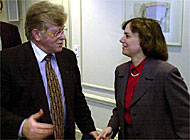Switzerland is important partner for World Food Programme

Switzerland, although not a member of the United Nations, is the world's 12th largest contributor to the World Food Programme, donating SFr30 million annually. Catherine Bertini, the director of the programme, has been in Bern to hold talks with Swiss officials.
Bertini thanked Switzerland for its contribution, saying it was not only generous, but also very efficient. “The Swiss are very fast,” she said, “we can call on them at a moment’s notice, and food aid is delivered the following day.”
Walter Fust, director of the Swiss Development Agency, said the scale of Switzerland’s commitment to the World Food Programme was an indication of how important the agency was.
“The World Food Programme is our most important partner for humanitarian aid,” said Fust. “And,” he added, “to my mind it is by far the UN’s most efficiently managed agency, with a very clear policy.”
But Catherine Bertini’s visit to Switzerland was not primarily for the exchange of compliments. She also visted the Swiss parliamentary session in Lugano, and held talks with the foreign minister, Joseph Deiss.
The Swiss parliament is considering a motion to increase its aid to the UN agency, although no decision is expected during this parliamentary session.
Last year the World Food Programme received 80 per cent of the aid it asked for to help people in areas of conflict. While this was good, Bertini said it was not enough.
“We need to increase our aid to people who are simply poor,” Bertini said. “There are 800 million people in the world who exist on less than a dollar a day, and they have great difficulties feeding themselves.”
Nevertheless, the World Food Programme, together with other UN aid agencies, has received criticism in the past few years for inefficient use of resources and bad targeting of needy groups. Bertini was quick to reject these charges.
“We have a system of monitoring in each country where we deliver aid,” she said, “of course we can’t count every single grain and kernel, but we can follow the food and make sure it ends up where it should end up. Any country that shows more than a two per cent deficit has to pay back the loss. And almost none of our recipient countries show a loss like that.’
The World Food Programme also runs incentive programmes to encourage young people to get an education. In some African countries, girls are given free food for their families once they have completed a month’s schooling.
In Afghanistan, the agency faced a more difficult dilemma when it decided to cut food aid to schools which were refusing to teach girls.
“Of course this was hard,” said Bertini, “many people accused us of neglecting the boys, but now we have found some schools which still teach girls, and so we are giving food aid to both again.”
Walter Fust believes these dilemmas can be solved with a pragmatic approach and careful monitoring of where the food aid is going. But for Fust, the provision of food to hungry people is such a basic obligation that Switzerland will remain a significant contributor to the World Food Programme for many years to come.
“Food is the first thing people in need long for,” he said. “You can’t speak about democracy or human rights if you have an empty stomach. And whoever does not get food is bound to die.”
by Imogen Foulkes

In compliance with the JTI standards
More: SWI swissinfo.ch certified by the Journalism Trust Initiative
You can find an overview of ongoing debates with our journalists here . Please join us!
If you want to start a conversation about a topic raised in this article or want to report factual errors, email us at english@swissinfo.ch.